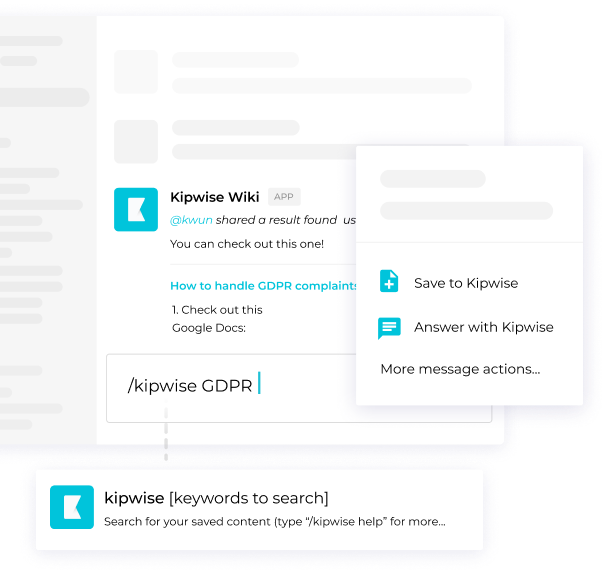In today's fast-paced digital landscape, artificial intelligence (AI) is revolutionizing the customer service industry by offering numerous ways to enhance efficiency and improve customer experiences. As businesses strive to meet rising consumer expectations, incorporating AI solutions can bring your customer support to a new level. This blog post explores 10 effective ways to integrate AI into your customer service strategy, highlighting best practices to ensure a smooth implementation.
What is AI in Customer Service?
AI in customer service refers to the use of artificial intelligence technologies to improve interactions between businesses and their customers. From chatbots that provide instant support to data analytics that inform decision-making, incorporating AI in customer service can enhance efficiency, reduce response times, and provide personalized support, ultimately improving customer satisfaction and loyalty.
Benefits of AI in Customer Service
There are numerous benefits of implementing AI in customer service, including but not limited to round-the-clock customer support, quicker response times, personalized customer experience and cost savings. Leveraging AI in your customer support function can improve efficiency and foster stronger relationships with your customers, ultimately leading to a more competitive edge in the marketplace.
- 24/7 availability: AI chatbots can help to automate customer support, ensuring customers can get help whenever needed.
- Reduce wait time: Automated tools can quickly handle inquiries, reducing wait times and improving satisfaction.
- Improved agent efficiency: AI can assist human CS representatives by providing recommended responses and information, allowing them to resolve issues more quickly.
- Reduce cost: AI can automate routine tasks, allowing businesses to allocate resources more effectively and reduce operational costs.
- Scalability to handle high support demand: AI solutions can easily scale to manage increased customer interactions during peak times without compromising quality.
- Personalization: AI analyzes customer data to deliver tailored experiences, enhancing engagement and loyalty.
- Improve customer satisfaction: AI ensures uniform responses, maintaining quality and accuracy across customer interactions.
- Insights and analytics: AI tools provide valuable data insights, helping businesses understand customer behavior and preferences.
10 Ways to Incorporate AI in Customer Service
1. Use AI chatbots for instant customer support
AI chatbots can significantly automate customer support by providing instant responses to common inquiries, ensuring 24/7 availability for customers.
To effectively use AI chatbots for instant customer support, start by defining common use cases like FAQs and order tracking. Choose a chatbot platform that integrates with your systems and design intuitive conversational flows. Implement natural language processing (NLP) to enhance understanding, and train the chatbot with diverse interactions. Ensure there are options for escalation to human agents when needed, and regularly monitor performance to identify improvements. Finally, gather customer feedback to refine the experience, enabling efficient and responsive support.
2. Guide human agents to resolve issues faster
AI can effectively guide human customer support agents by providing real-time insights and recommendations during interactions. By analyzing customer queries and previous interactions, AI tools can suggest relevant solutions and resources, allowing agents to resolve issues more quickly. Additionally, AI can automate data retrieval, ensuring agents have all necessary information at their fingertips. This support not only streamlines the resolution process but also enhances the agent's confidence and efficiency, ultimately leading to improved customer satisfaction and faster service.
For example, Kipwise is a company knowledge base solution that integrates with ChatGPT. So it can analyze your customer inquiries using natural language processing techniques and prompt your agents with relevant information from your own knowledge base to resolve issues more quickly.
3. Intelligent routing and prioritization
AI enables intelligent routing and prioritization in customer service by analyzing incoming inquiries and automatically directing them to the most appropriate agents or teams. By evaluating factors such as urgency, customer history, and issue complexity, AI ensures that high-priority cases are addressed promptly, while routine inquiries are managed efficiently. This intelligent system reduces response times and optimizes resource allocation, enabling customer support agents to focus on more complex issues. As a result, customers receive quicker, more effective customer support, leading to higher customer satisfaction and loyalty.
4. Improve your customer help center with AI
Customer service AI can help improve your customer help center by identifying knowledge gaps and suggesting what new help desk articles you should add to your customer knowledge base. You can even utilize AI to draft your content more efficiently, reducing the time and effort needed to scale your customer help center.
You can also improve your customer help center with AI by implementing chatbots for instant support, providing 24/7 service and quick responses to common inquiries. For example, Kipwise is a knowledge base solution where you can create a customer knowledge base that integrates with ChatGPT easily.
5. Predict customer needs using AI analytics
AI can help predict customer needs by analyzing vast amounts of data, including past interactions, purchase history, and behavior patterns. By leveraging machine learning algorithms, AI identifies trends and anticipates what customers may require next, allowing businesses to proactively address their needs. This predictive capability enables personalized recommendations and timely support, creating a more tailored customer experience. As a result, customers feel they are understood and valued, leading to higher customer satisfaction and loyalty, while businesses can enhance engagement and drive sales effectively.
6. AI-powered sentiment analysis for customer feedback
AI can provide valuable customer feedback through sentiment analysis by assessing the emotional tone of customer interactions, such as reviews, social media posts, and support tickets. By using natural language processing (NLP), AI algorithms can identify positive, negative, or neutral sentiments, allowing businesses to gauge customer satisfaction and sentiment trends. This real-time analysis helps organizations understand customer perceptions and feelings about their products or services, enabling them to make informed decisions and improvements. Ultimately, leveraging sentiment analysis fosters a more responsive approach to customer needs and enhances overall experience.
7. Multilingual support with real-time language translation
AI can enable multilingual support through real-time language translation, allowing businesses to communicate effectively with customers from different linguistic backgrounds. By utilizing advanced natural language processing (NLP) and machine learning algorithms, AI tools can instantly translate text and speech, facilitating seamless interactions in multiple languages. This capability enhances customer service by breaking down language barriers, ensuring that all customers receive personalized support, regardless of their preferred language. As a result, businesses can expand their reach and improve customer satisfaction by providing a more inclusive and accessible experience.
8. Voice AI and Speech Recognition in Customer Service
Voice AI and speech recognition technologies can significantly streamline call center operations by automating routine tasks and enhancing customer interactions. These systems can quickly transcribe conversations, allowing agents to focus on providing personalized support rather than note-taking. Additionally, voice AI can analyze customer sentiments in real-time, enabling agents to tailor their responses effectively. By routing calls based on voice commands and identifying common issues, these technologies improve efficiency and reduce wait times. Ultimately, integrating voice AI helps create a smoother, more responsive call center experience for both agents and customers.
9. Drive upsells and cross-sells during support interactions
AI can drive upsells and cross-sells during support interactions by analyzing customer data and identifying relevant products or services based on individual preferences and purchase history. During support conversations, AI can suggest complementary items or upgrades in real-time, seamlessly integrating these recommendations into the dialogue. By understanding customer needs and contexts, AI enhances the chances of successful upselling while providing value to the customer. This proactive approach not only boosts sales but also enriches the customer experience by offering solutions that genuinely meet their requirements.
10. AI in quality control and agent training
AI can enhance quality control in customer support by continuously monitoring interactions and analyzing performance metrics. By evaluating call recordings, chat transcripts, and customer feedback, AI identifies areas for improvement and highlights best practices. This data-driven approach allows customer support managers to pinpoint skill gaps and tailor relevant customer support training programs for agents, ensuring they receive the specific guidance needed to enhance their performance. Furthermore, AI can provide real-time feedback during interactions, helping customer support reps adjust their approaches on the fly. Ultimately, this leads to higher customer service quality and more effective, well-trained customer support teams.
Best practices for implementing AI in customer service
Here are some best practices for implementing AI in customer service:
- Define Clear Objectives: Establish specific goals for AI implementation, such as reducing response times or improving customer satisfaction.
- Choose the Right Tools: Select AI tools that align with your needs, such as chatbots, analytics, or voice recognition systems. See our top picks of AI Chatbots that you can check out.
- Integrate with Existing Systems: Ensure AI solutions seamlessly integrate with your current customer service platforms for a cohesive experience.
- Train Your AI: Continuously feed your AI with diverse data to improve its understanding and accuracy in responding to customer inquiries.
- Focus on User Experience: Design AI interactions to be intuitive and user-friendly, ensuring customers feel comfortable using the technology.
- Provide Human Support: Always offer an option to escalate to a human agent for complex issues, maintaining a personal touch in customer service.
- Monitor and Analyze Performance: Regularly assess AI performance through metrics and customer feedback to identify areas for improvement.
- Educate Staff: Train customer service agents on how to effectively use AI tools and understand their capabilities.
By following these best practices, businesses can maximize the benefits of AI in customer service while ensuring a positive experience for customers.
Frequently asked questions
1. Is AI replacing human customer service?
While AI is transforming customer service by automating routine tasks and enhancing efficiency, it is unlikely to fully replace human agents. Instead, AI is best viewed as a complementary tool that handles repetitive inquiries and provides data-driven insights, allowing human agents to focus on more complex and nuanced customer interactions. The emotional intelligence and empathy that human agents bring to the table are essential for resolving sensitive issues and building strong customer relationships. Ultimately, the future of customer service will likely involve a hybrid approach, combining the strengths of both AI and human support to deliver exceptional service.
2. How to ensure data security when incorporating AI in customer service?
To keep your data secure when incorporating AI in customer service, it’s essential to implement robust security measures from the outset. Start by ensuring that all data is encrypted both in transit and at rest to protect sensitive customer information. Use access controls to limit who can view and interact with AI systems, and regularly audit these permissions. Additionally, comply with relevant data protection regulations, such as GDPR or CCPA, to safeguard customer privacy. Regularly update your AI systems and conduct vulnerability assessments to identify and mitigate potential security risks. By prioritizing data security, you can build customer trust while leveraging AI effectively.




